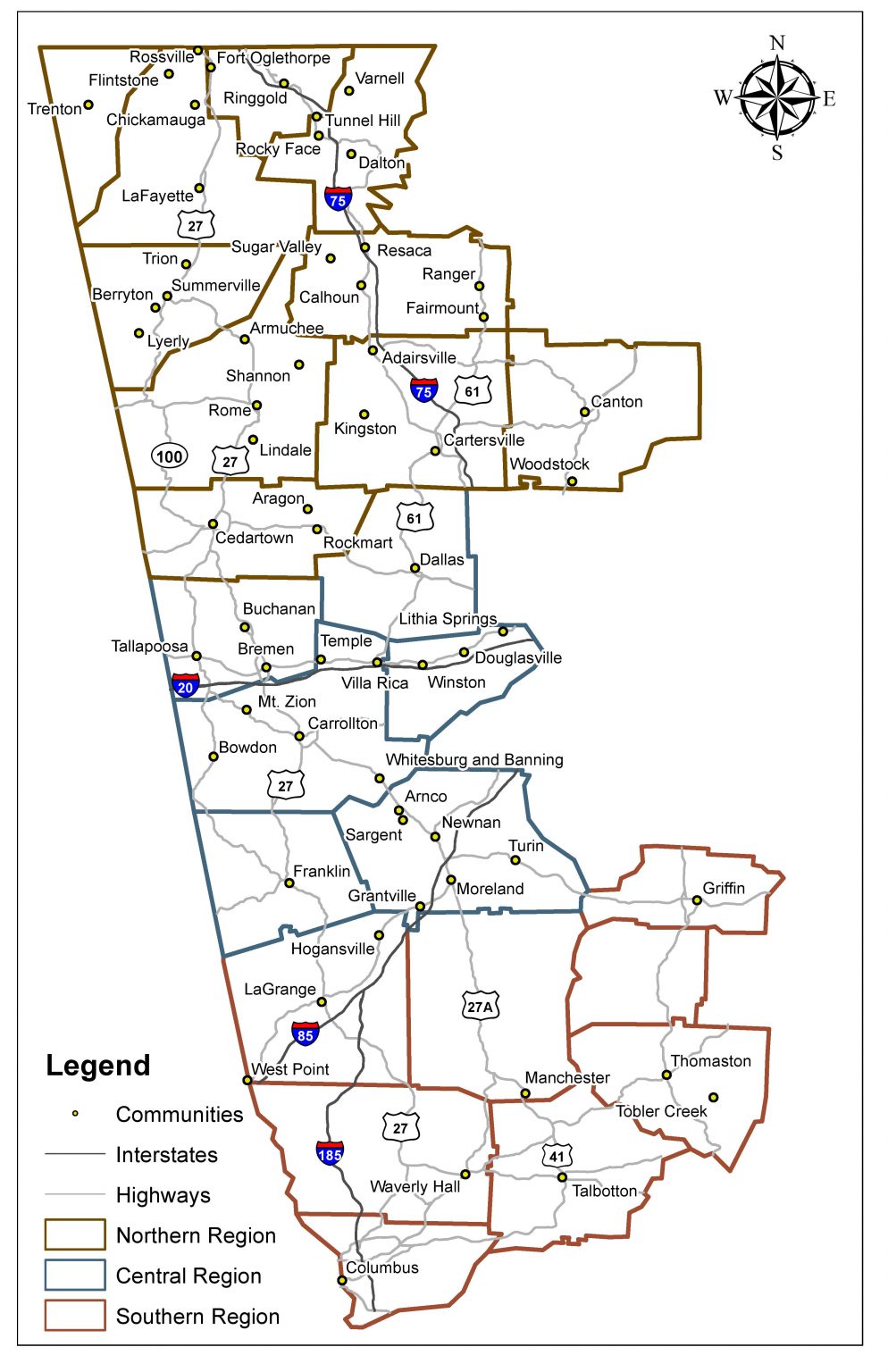The textile industry in this previously cotton-based community began with a single cotton mill and expanded to hand-tufted bedspreads along U.S. Highway 41.
Beginning as a Cherokee village, Adairsville is a small town that has primary access to U.S. Highway 41, also known as “Bedspread Boulevard”. This allowed for a way for economic relief after the boll weevil epidemic decimated the local cotton industry. To this day, Adairsville takes part in the Dixie Highway Yard Sale and its citizens continue to practice hand-tufting.
Visit
Things to Do
- Adairsville Rail Depot, 101 Public Square: The museum, located in historic downtown Adairsville , tells the story of the chenille bedspread industry and even has a few of these bedspreads on display. In the Spring of 2017, Dr. Jennifer Dickey supervised a class-curation of the Rail Depot for Kennesaw State University students. Their hours of operation are Tuesday through Saturday 11:00 am – 3:00 pm.
- Barnsley Gardens Resort, 597 Barnesley Gardens Road: Located 5 miles from downtown Adairsville, this historic home and gardens property is now a popular resort and Bed & Breakfast.
- Historic Downtown Adairsville: Adairsville was the first city in Georgia to be placed, in entirety, on the National Register of Historic Places.
Places to See
The following properties are not open to the public, but you can view them from the exterior to learn more about the buildings that supported the textile industry here.
- Shaw Industries Plants T1, LG, and DL: These plants are visible from 7195 GA-140, 843 Union Grove Road, and 947 Union Grove Road, respectively.
- Adairsville Gin and Warehouse Company, 204 South Main Street: While this location now houses non-textile businesses, the original building still stands.
History
The city of Adairsville was Cherokee land until the 1830s. The small, Oothcalooga Village, was later developed into a small industrial town in 1836 through the purchase of a Cherokee Land lottery and the “Trail of Tears”. The town was incorporated almost twenty years later in 1854. Adairsville benefited from a great location as the city was halfway between Chattanooga and Atlanta, but also directly on the Western and Atlantic Railroad. The easy access to travel corridors – the railroad and eventually the interstate system – made Adairsville an inviting choice for the textile industry.
The development of the textile industry in the region began with the establishment of the Oothcalooga Cotton Mill, in 1872. Operating for twelve years and employing 70 people, the mill housed 2,000 spindles, consumed about 20 bales of cotton weekly, and produced nearly 4,000 yards of blue denim daily.
After World War I, the boll weevil epidemic began to destroy Adairsville’s cotton-based economy. The devastation of the epidemic encouraged many citizens to start making hand-tufted bedspreads. H.C. McCutchen, a downtown merchant in Adairsville, sold unbleached sheeting and tufting to the local citizens. The locals, who became known as haulers, took stamped-patterned sheeting and thread to the rural areas surrounding Adairsville to be tufted by hand.
Tufters living along U.S. Highway 41 worked out of their homes and hung wire lines to spread out their chenille peacock design bedspreads and bathrobes to sell. Soon nicknamed ‘Peacock Alley’ after the common design of the chenille bedspreads, Highway U.S. 41 soon became widely known for its “spread lines.” As technology advanced with textiles and automobiles, this stretch of paved highway soon was known as the “Dixie Highway” as the travel route was used by tourists heading south to Florida.
Adairsville continues to thrive and prosper, encouraging economic development while preserving its unique historical legacy. Keeping the hand-tufted tradition alive, Adairsville continues to host an annual three-day 90-mile Dixie Highway Yard Sale, the first weekend of June each year.
Charter Trail Members
- Adairsville Welcome Center and Rail Depot
- Barnsley Resort
- Cartersville-Bartow Chamber of Commerce
- Cartersville-Bartow Convention and Visitors Bureau
- Etowah Valley Historical Society
Resources to Explore
Click on the following links to learn more about this region.
- Adairsville, Georgia Oral Histories
- Bartow History Museum Archives
- Facts for Kids
- Digital Library of Georgia
- Georgia Archives Virtual Vault
- Georgia Historical Society
- Bartow County, New Georgia Encyclopedia
Back to Community List
Email the Trail at wgtht@westga.edu or visit our Contact Us page for more information.
